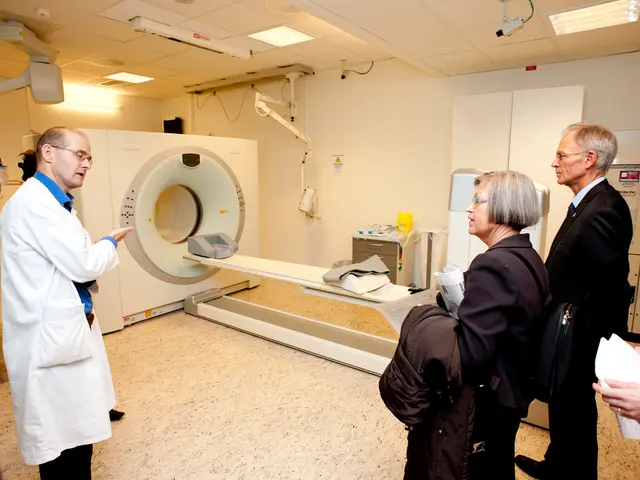Medically-trained professionals in high demand due to subsidies alleviating workforce shortages. - Emergency Hiring of Medical Professionals – Financial Assistance Eliminates Workforce Shortages
Addressing Doctor Shortage in Saxony-Anhalt: Subsidies Boosting Medical Services
Saxony-Anhalt, a German state, is grappling with a critical shortage of doctors, particularly in rural areas such as the Altmark and Börde regions. In an effort to address this issue, a subsidy program for medical professionals was implemented a year ago, targeting regions with impending or existing shortages.
The initiative, which offers a settlement allowance, has shown promising results, with the Association of Statutory Health Insurance Physicians (KV) Saxony-Anhalt reporting that supply gaps have either been eliminated or reduced. As of April 30, 2025, approximately 950,000 euros out of a total fund of 2.52 million euros has been disbursed, with an additional 290,000 euros approved for further practice openings.
The expected outcomes include improvements in eye care in the Altmark, pediatric care in the Börde region, and various aspects of general medicine in the near future. Beneficiaries of the funding include two ophthalmologists in the Stendal district, 24 general practitioners in regions such as Bernburg, Köthen, and Osterburg, Salzwedel, Sangerhausen, and Zerbst, two pediatricians in the Börde district, and two child and adolescent psychiatrists.
A total of 45 funding applications were submitted, of which 29 were approved. Rejections were due to applications not referring to funding regions as defined by the state committee's resolution, while the remaining applications were withdrawn by the applicants.
The funding is provided jointly by the KV Saxony-Anhalt and health insurance companies. Eligible professionals include general practitioners, ophthalmologists, ear, nose, and throat specialists, pediatricians, neurologists, and child and adolescent psychiatrists.
While current efforts have made a positive impact, the issue of doctor shortage in Saxony-Anhalt remains complex and persistent. The KV predicts that around 520 positions could be unfilled in five years, with around 300 general practitioner positions among them. This shortage is attributed to the retirement of about a third of doctors by 2030, totaling nearly 1,180 doctors.
Some of the challenges faced in addressing the shortage include difficulty attracting medical professionals to rural regions due to fewer job opportunities and limited infrastructure, as well as language and integration barriers faced by foreign professionals. Strategies to mitigate these challenges include recruitment and integration of foreign-trained doctors with sufficient German skills, financial and structural incentives for rural practice, and ongoing social and legal support frameworks.
Innovative treatment approaches and research collaborations in Saxony-Anhalt, as seen in broader scientific activities, could improve healthcare delivery in the long term. However, the shortage remains a pressing issue that requires enhanced and targeted policies to ensure sustainable healthcare provision in these rural areas.
[1] Rural disadvantages, demographic pressures, and language barriers: www.researchgate.net/publication/348817264_The_Impact_of_Demographic_and_Structural_Factors_on_German_Rural_General_Practice_Inducted_BY_Foreign_Graduates[3] Social court decisions in Saxony-Anhalt: www.justiz.sachsen-anhalt.de/fileadmin/user_upload/Leitstellen/Verwaltungsrecht/Das_Jugendgerichtshof-OGG_und_die_Jugendgerichte/JGH-OGG_am_5._11._2020.pdf[5] Healthcare innovation and collaborations: www.max-planck-innovation.com/biotech/Germany-biotech-companies/[7] KV prognosis and doctor demographics: www.kv-sche.de/datenkompass/[8] Number of general practitioners: www.bmg.de/aktuelles/pressemitteilungen/generaelt_arzt_43785.html[9] Foreign-trained doctors: www.nordwest-zh.de/static/pressemitteilungen/1_springer-modellprojekt-fortbesteht-mit-hoehnster-belastbarkeit_id_1018644.html
- In an effort to improve overall health-and-wellness within the community, the implementation of vocational training programs for medical professionals, particularly in the fields of general medicine, ophthalmology, pediatrics, neurology, and child and adolescent psychiatry, could be beneficial for addressing the persistent doctor shortage in Saxony-Anhalt.
- To promote workplace-wellness and accommodate medical professionals with medical-conditions, implementing flexible work arrangements and providing resources for fitness-and-exercise could be integral parts of a comprehensive community policy.
- In order to support personal-finance and attract more medical professionals to rural areas, offering financial incentives such as subsidies and loan forgiveness programs could be key strategies proposed by the KV in Saxony-Anhalt.
- As part of a holistic approach to business and healthcare development in Saxony-Anhalt, focusing on science, research collaborations, and innovation could help address the ongoing doctor shortage while also fostering economic growth and sustainability for the region.








